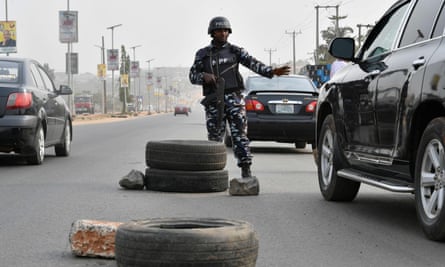Bola Tinubu, the candidate of the ruling party in Nigeria, has maintained his lead as results of Saturday’s election slowly become clear amid growing criticism of electoral authorities and accusations of rigging.
The count has now moved into a third day, hit by multiple technical and logistical problems that the Independent Nigerian Election Commission (Inec) appears unable to resolve.
The difficulties could mar a poll analysts describe as a “bellwether” election that could be a crucial turning point for Nigeria, after several years of worsening insecurity and acute economic troubles. Many believe a credible poll and progress in tackling the multiple problems facing Africa’s most populous country are key to stability across a swath of the continent.
Three candidates are contenders to replace the outgoing two-term president, Muhammadu Buhari. The favourite remains Tinubu, from the ruling All Progressives Congress (APC). Also in the running are Atiku Abubakar, of the main opposition People’s Democratic party (PDP); and the Labour party’s Peter Obi.
Tinubu, 70, and Abubakar, 76, are seen as traditional politicians representing Nigeria’s established political elite. Obi, 62, is considered a reformist who has reached across the country’s faultlines to woo voters from all communities and ran a slick social media campaign to attract the young.
A Reuters tally of preliminary results early on Tuesday morning showed Tinubu leading on about 36%, with Abubakar trailing close behind with 30% and Obi on 20% or about 3.8m votes.
Another running total of officially declared presidential votes, compiled by local consultancy Stears, showed Tinubu on more than 40%, with Abubakar on about 30% and Obi on less than 15% on Tuesday at around noon local time. If provisional votes yet to be officially declared by Inec were included, Obi would be in second place.
The APC also appears to be doing well in senate elections and senior officials close to Tinubu have told the Guardian that they are confident of victory.
Some results continue to surprise, such as Obi’s victory in Lagos, Nigeria’s commercial and cultural capital.
Though the contest is still relatively close, Nigerian electoral law makes a runoff unlikely as the winning candidate needs only a plurality of votes, provided they get 25% of the vote in at least two-thirds of the 36 states.
Currently, it is the delays to voting, not the results, that dominate conversations in Nigeria. Experts warn that the problems with the count could lead to contestation and even violence.
“Politics is very much like a business in the minds of many actors. It’s not about serving the people, it is about serving the self. So you see a very vociferous campaign and a great difficulty to accept defeat,” said Prof Abiodun Adeniyi, an expert in politics and communication at Baze University, Abuja.
On Monday night, Olusegun Obasanjo, the former president, warned of a “looming danger ahead” caused by the failure of systems that would electronically send results to a central computer.
The results were “not a true reflection of the will of Nigerians who have made their individual choice”, he said.

“They are rigging it. This is what the delay is about. I can get online and upload or download or whatever in one minute so what is taking them so long?,” asked Peter Sogbetun, a driver in Lagos.
There was also anger in Abuja, where the two leading opposition parties claimed results announced by Inec in the capital and those logged at polling stations did not match.
“We are Nigerians and must defend our rights,” said Dino Melaye, a veteran PDP politician.
Election officials said the results had been fully authenticated and government loyalists accused the opposition of fomenting “lawlessness and anarchy”.
International observers have also criticised Saturday’s vote, which was largely peaceful despite expectations of widespread chaos and violence.
A team of observers led by Joyce Banda, former president of Malawi, said delays on voting day, which led to many polling stations opening hours late, meant the election “fell well short of Nigerian citizens’ reasonable expectations”.
An EU mission said the failures “reduced trust in the process and challenged the right to vote”.
Nigeria is contending with multiple intersecting crises including economic turmoil, extremism and criminality affecting much of the country. In recent weeks, an effort to replace almost all Nigeria’s banknotes – in part to reduce the widespread practice of vote-buying – has caused massive economic disruption and much popular anger.
However, analysts point out this is the seventh poll held since the end of military rule in 1999 and that some Nigerian democratic institutions are growing stronger. That none of the main candidates are former military officers – a first for a Nigerian poll – is also viewed as an achievement. The decision of Buhari, 80, to respect the constitutional two-term limit has also been cited as a positive sign.
There have been concerns raised about the limited number of women contesting the poll.
Evin Incir, head of delegation of the European parliament, said: “I wish to express my concern that less than 10% of candidates were women. The next government and parliament should heed to the manifestos of the main political parties of Nigeria, which call for affirmative action, such as quotas.”

